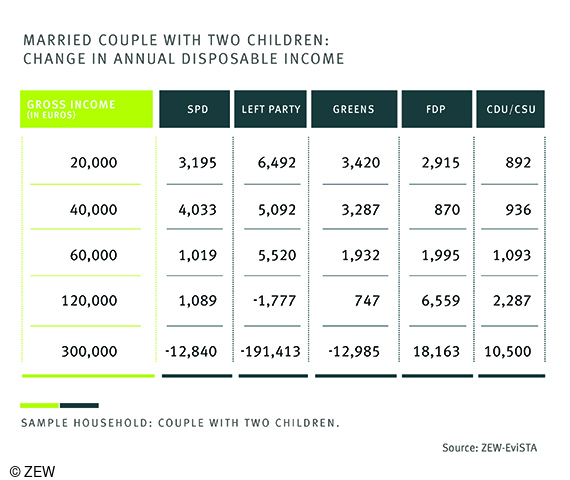ZEW-EviSTA
Evaluation Model for Integrated Tax and Transfer Policy Analyses
The ZEW-EviSTA model (in German short for Evaluation Model for Integrated Tax and Transfer Analyses) is used to estimate the costs and distributional outcomes of the tax and transfer system in Germany. The model is combined with data from the German Socio-Economic Panel (SOEP) and allows an analysis of the existing system as well as the simulation of reform proposals, taking potential labour market effects into account.
The team of experts at ZEW has many years of experience in economic analysis of the German tax and transfer system and has advised a large number of institutions with the help of ZEW-EviSTA. These include the Federal Ministry of Labour and Social Affairs (BMAS), the Federal Ministry for Economic Affairs and Climate Action (BMWK), the Federal Ministry of Family Affairs, Senior Citizens, Women and Youth (BMFSFJ), the German Parliament fraction Alliance 90/The Green Party, and the Bertelsmann Stiftung.
The focus of ZEW-EviSTA is on private households. ZEW-EviSTA is thus a complement to other models developed at ZEW such as the European Tax Analyzer that deal with corporate taxation.
ZEW-EviSTA: A Microsimulation Model
With EviSTA, ZEW has an established a microsimulation model at its disposal that has been used in numerous policy advising projects. The model uses the latest data from the German Socio-Economic Panel (SOEP) and incorporates the current legal status as of 2021. An advantage of the SOEP is the good coverage of households in lower income brackets.
ZEW-EviSTA models income taxes and social security contributions as well as child benefits and social transfers. The latter include social subsistence benefits SGB II and SGB XII, the federal supplementary child benefit for needy families, and housing subsidies. EviSTA includes a model for the take-up of these benefits.
ZEW-EviSTA model makes it possible to comprehensively and differentially track the impacts of changes to the tax and transfer system. Target variables used for private households in Germany include the amount, changes, and distribution of wages, as well as disposable income (including its specific components, such as claims for housing assistance). On the other hand, the effects of the reform on the government budgets are measured as well, in order to provide a mirror-image perspective to the private households. Included in this is the revenue from taxes and social security contributions as well as the costs of governmental transfer payments.
The model has the capability to simulate the so-called “morning after” effects (also known as first-round policy effects) of reforms, i.e. effects for given behaviour of the households. The model also allows the simulation of behavioural adjustments to policy change in the form of labour supply reactions. A discrete utility maximisation model is used to simulate these effects. ZEW-EviSTA is a static structural model for household labour supply that models the labour supply decision as an optimal choice between different categories of working times. Through interventions in the tax and transfer system, the utility of individual working time categories changes, which may lead to changes in behaviour. Labour supply effects are obtained as the sum of simulated utility-maximising individual choices against the background of changed monetary incentives to work. The incentives to work that result from the reform variants can therefore be represented in great detail (e.g. participation decisions or changes in working hours).






